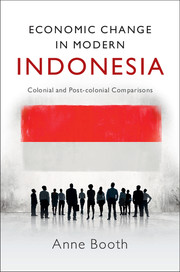Book contents
- Frontmatter
- Contents
- List of tables
- Acknowledgements
- 1 Introduction: Indonesia's three watersheds
- 2 The colonial legacy
- 3 Occupation, liberation and the challenges facing the new republic, 1942–66
- 4 Suharto's economic record: successes and failures
- 5 The 1997–98 crisis and its legacy: dropping out again?
- 6 The SBY years: building a new Indonesia?
- 7 Economic nationalism, economic rationalism and the development of private business after 1950
- 8 Trends in poverty and income distribution: the Suharto era and beyond
- 9 The changing role of government from the colonial era to the post-Suharto years
- 10 Conclusions
- Bibliography
- Index
7 - Economic nationalism, economic rationalism and the development of private business after 1950
Published online by Cambridge University Press: 05 February 2016
- Frontmatter
- Contents
- List of tables
- Acknowledgements
- 1 Introduction: Indonesia's three watersheds
- 2 The colonial legacy
- 3 Occupation, liberation and the challenges facing the new republic, 1942–66
- 4 Suharto's economic record: successes and failures
- 5 The 1997–98 crisis and its legacy: dropping out again?
- 6 The SBY years: building a new Indonesia?
- 7 Economic nationalism, economic rationalism and the development of private business after 1950
- 8 Trends in poverty and income distribution: the Suharto era and beyond
- 9 The changing role of government from the colonial era to the post-Suharto years
- 10 Conclusions
- Bibliography
- Index
Summary
Economic nationalism after 1945
It was argued in Chapter 3 that the terms of the financial agreement finally agreed in 1949 were considerably harsher than those negotiated with the former colonial powers by other newly independent governments in Asia, including India, Pakistan and the Philippines. An Indian economist pointed out that, along with an impoverished economy, newly independent India ‘also inherited some useful assets, in the form of a national transport system, an administrative apparatus in working order, a shelf of concrete development projects and substantial reserves of foreign exchange’ (Vaidyanathan 1983: 948). Independent Indonesia had few such assets after almost four years of Japanese occupation followed by four more years of war against the Dutch army. The terms under which power was transferred caused bitterness among even the more moderate leaders, and after 1950 the continuing Dutch economic presence fuelled nationalist sentiments in the parliament and in the business community. An issue which was bound up with resentment against the Dutch was the position of the Chinese, whose economic role seemed to many nationalists to be way out of proportion to their relatively small numbers compared with the indigenous population.
The 1930 Population Census had enumerated 1.233 million Chinese in the whole country, which was only about two per cent of the population of 60 million. The percentage was probably slightly higher after 1950, as in-migration from China, although restricted, did continue until 1940. In addition, the Chinese tended to have large families and lower rates of infant and child mortality than most indigenous Indonesians. Mackie (2005: 98) suggested that the ethnic Chinese could have numbered around two million, or 2.5 per cent of the total population, in the early 1950s. As a result of their better access to education in the late colonial era, and the emphasis that many assimilated, Dutch-speaking Chinese families placed on professional qualifications, the Chinese were over-represented in occupations such as medicine and law. It was also widely believed that Chinese owned many of the medium- and large-scale businesses not controlled by the Dutch or other foreign interests. Those Chinese who had migrated to Indonesia in the 1920s and 1930s often went into business using contacts with other members of their extended families or dialect groups.
- Type
- Chapter
- Information
- Economic Change in Modern IndonesiaColonial and Post-colonial Comparisons, pp. 130 - 156Publisher: Cambridge University PressPrint publication year: 2016

